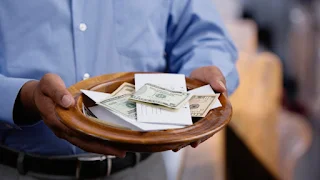This is a request for help from my readers.
My current place of employment has much in common with a carnival. It is a loose confederation of related businesses that are scattered over a 200,000ft-square footprint. Each business has exposure to a certain amount of cash sales. The employees are paid minimum wage.
Based on variability of cash receipts between operators, and based on ratios of cash-to-credit card and cash-to-coupon sales, there is a 99.999% chance that some of the operators are "skimming" some percentage of the cash sales.
Vignettes
Suppose one of the businesses is a hotdog stand. The operator brings his own package of hotdogs and buns in his lunch and the first eight hotdogs he sells at $5 each are his own. Those dollars go into his pocket. He does not ring them up on the cash register. Untraceable.
In the bartending trade this is sometimes called "bobbing", Bringing Own Bottle. The natural tendency is for the bobber to front-load the fraud at the start of his shift to get rid of the evidence of the bottle he brought in.
Suppose it is a ride at the carnival. Two-thirds of the customers pay with "tickets". One-third of the customers are either impulse customers or customers who used all of their tickets. They have the option of paying cash. At the end of the day the operator slips two $20 bills into his pocket and turns in the rest.
The tendency of the person committing this kind of fraud is to back-load the act and skim the cash at the very last moment.
Enterprise value
One common way of establishing the "Enterprise Value" of a business is to take the annual profit and multiply it by some factor. This factor, called the Enterprise Multiple, varies by industry but they range from 5-to-15.
Since the cash that is skimmed is almost pure profit, each $40 skim reduces the value of the enterprise by an average of $400.
The skeptic might claim that Enterprise Value is irrelevant unless the owner sells the business. The counterargument is that Enterprise Value is a huge factor in creditworthiness. A lower Enterprise Value reduces a business owner's access to credit and ratchets up the interest rates he must pay, particularly when he is approaching his limit.
The carnival worker who worked seven days a week for eight weeks and skimmed $40 a day reduced the Enterprise Value of the business by $22,000.
Moral Hazard
Cash sales represents moral hazard. Some operators get greedy and don't turn in any cash. Those are the easy ones to identify.
Other operators skim a smaller percentage of the take and they are hard to find.
Ideally, there would be systems or practices that would reduce the moral hazard. Even in the case of the greedy operator, it would be more desirable to NOT fire him because firing him means training another operator...who might be equally dishonest. It is better to have robust systems in place so the greedy operator is not temped to steal.
Deconstructing Regression-to-the-mean
Averages of large numbers of events tend to smooth and hide outliers. It is useful to break aggregate numbers into its subcomponents to find the interesting events.You have to slice the loaf of bread to find the diamond ring.
One countermeasure that is being considered is to have the cash collected at multiple times of the day. That should make a $40 skim pop up because it would not be buried in the larger, daily take. Our thinking is that most operators will stop skimming when it becomes too difficult to conceal the behavior.
Since multiple collections are labor intensive, the second idea was to have a drop-box and require the operators to drop their cash, less what is needed to make change, on an hourly basis. All of these folks have smart-phones. It is not a big trick to have an hourly alarm. An enhancement on this idea is to have the operator count the cash and write the amount on the pre-labelled envelop. That way, money counters who are downstream of the operators can also be held accountable.
The fact that the two common types of fraud, bobbers and skimmers tend to front-load and back-load their activities into the the first and last hour of the shift would make their activities transparent with hourly cash drops.
Frankly, the envelop solution is modeled after how many churches handle the collection of donations.
 |
| A cash drop-box does not need to be fancy. It can be a repurposed, salvaged electrical breaker box with a hasp. |
I will appreciate any feedback you guys might have. I know that there are tons of life experiences out there in my readership. What works? What does not work? Better ways of dealing with this issue will benefit business owners besides my boss because I think it is a common issue.
Index of Small Business Reports



No comments:
Post a Comment
Readers who are willing to comment make this a better blog. Civil dialog is a valuable thing.